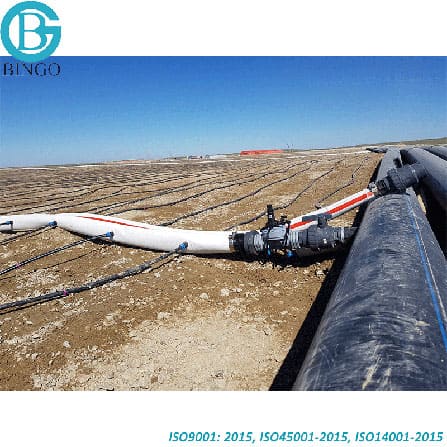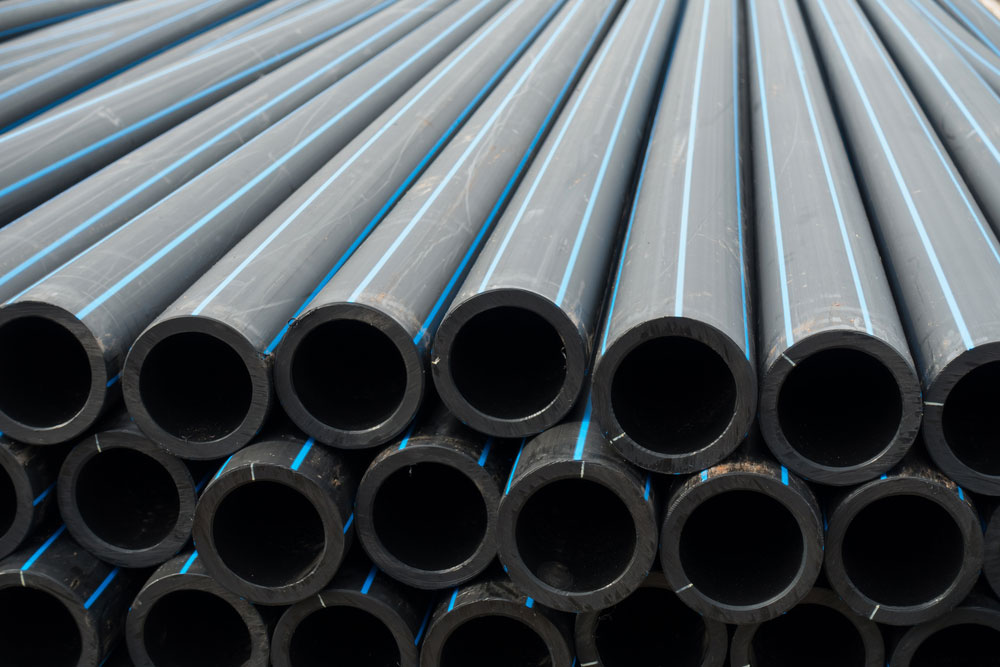A Comprehensive Overview to the Numerous Uses of HDPE Pipeline in Construction and Industry
HDPE pipelines have actually become an essential component in contemporary building and industrial applications. Their unique buildings, such as resistance to deterioration and lightweight layout, make them appropriate for a vast array of uses. From water systems to agricultural irrigation, HDPE pipes provide options that enhance efficiency and sustainability. Comprehending their diverse applications is important for specialists seeking to maximize framework. What details benefits do these pipelines give each industry?
Water Supply and Distribution Systems
Water supply and distribution systems are critical elements of city infrastructure, frequently depending on high-density polyethylene (HDPE) pipelines for their sturdiness and efficiency. These systems transport safe and clean water from therapy facilities to customers, making sure accessibility and safety and security. HDPE pipelines are favored for their resistance to deterioration, chemicals, and severe temperatures, which enhances their durability and minimizes upkeep prices. Furthermore, their light-weight nature permits simpler setup and transportation, making them excellent for different city and rural applications.
The adaptability of HDPE pipelines enables them to be installed in limited areas and around obstacles, decreasing the need for comprehensive excavation (American Plastics HDPE Pipe Manufacturing). Their smooth interior surface area minimizes rubbing losses, improving water circulation rates. As cities proceed to grow, the demand for trusted water supply systems boosts, positioning HDPE pipelines as a sustainable solution for modern facilities tasks. Their proven track record makes them a favored selection among designers and urban coordinators alike
Wastewater Management and Therapy
Effective wastewater administration and treatment are vital for maintaining public health and ecological quality. HDPE pipelines play a crucial duty in this process because of their resilience, resistance to rust, and ability to stand up to harsh chemicals. These pipelines are typically made use of in various applications, consisting of sewer systems, stormwater drain, and wastewater treatment facilities. Their light-weight nature assists in less complicated installment and transportation, decreasing labor costs and time.
On top of that, HDPE pipelines have a smooth indoor surface that minimizes rubbing loss, advertising effective circulation rates. They are likewise less prone to leaks and failings contrasted to typical products, ensuring that contaminants are included successfully. Their adaptability enables for versatility in different soil problems, making them suitable for diverse ecological settings. As markets progressively focus on lasting techniques, using HDPE pipes in wastewater monitoring systems lines up with goals for reducing environmental impact and enhancing resource recovery.
Agricultural Irrigation Solutions
In farming settings, effective irrigation solutions are essential for optimizing plant yields and handling water sources. HDPE (High-Density Polyethylene) pipelines play a crucial role in contemporary irrigation systems due to their longevity, versatility, and resistance to deterioration. Their capability to withstand high pressures makes them optimal for both surface and subsurface watering applications, making certain consistent water circulation across fields.
Farmers can utilize HDPE pipelines in drip watering systems, which provide water straight to plant roots, minimizing wastage and advertising healthy and balanced growth. Additionally, these pipelines are light-weight and very easy to set up, minimizing labor prices and installation time. Their long lifespan and low maintenance demands additionally improve their appeal in farming practices.
HDPE pipelines are environmentally pleasant, as they can be recycled and do not seep damaging chemicals right into the soil. This makes them a sustainable selection for farmers aiming to take on green farming techniques while making best use of performance.
Industrial Applications and Procedures
Versatility is a hallmark of HDPE pipes, making them vital in various industrial applications and processes. These pipelines are commonly made use of in chemical handling industries because of their excellent resistance to a wide variety of harsh substances. HDPE's lightweight nature, integrated with high tensile stamina, enables simple installation and long-lasting performance popular environments.
In the oil and gas field, HDPE pipelines play a crucial role in transporting hydrocarbons and gases, many thanks to their durability and flexibility - custom hdpe pipe manufacturing Midland TX. In addition, they are utilized in mining operations for the transportation of slurry and other products, where traditional piping systems might fail
In addition, HDPE pipes are progressively used in producing facilities for supply of water lines and wastewater monitoring. Their capacity to withstand severe temperatures and pressures makes them ideal for a selection of industrial procedures. On the whole, HDPE pipes contribute greatly to performance and safety and security across diverse commercial applications.
Stormwater Monitoring and Water Drainage Systems
Stormwater monitoring and drain systems are crucial elements in city facilities, made to take care of excess rainfall and decrease flooding risks. High-density polyethylene (HDPE) pipelines are increasingly used in these systems because of their longevity, versatility, and resistance to rust. These pipelines successfully move stormwater far from inhabited locations, reducing surface overflow and protecting against waterlogging.
HDPE's light-weight nature promotes much easier installation, decreasing labor costs and building time. Furthermore, its resistance to chemicals and environmental stress factors guarantees longevity and integrity in numerous climates. In addition to traditional water drainage applications, HDPE pipes are also employed in innovative remedies such as eco-friendly infrastructure, that includes rain gardens and permeable pavements.

Frequently Asked Questions
Exactly How Does HDPE Pipe Contrast to PVC Pipe in Expense?
Generally, HDPE pipe has a tendency to be extra costly than PVC pipeline as a result of its boosted longevity and versatility. Long-lasting cost factors to consider, such as maintenance and life-span, may prefer HDPE in specific applications.
What Is the Life-span of HDPE Piping Under Numerous Conditions?
HDPE pipes generally have a lifespan of 50 to 100 years, relying on environmental problems, setup practices, and usage. Variables such as temperature level, soil type, and exposure to chemicals can significantly affect their sturdiness.
Can HDPE Pipes Be Recycled After Use?
Yes, HDPE pipelines can be reused after usage. The recycling procedure involves melting down the product, allowing it to be repurposed into new items, website consequently advertising sustainability and minimizing environmental impact associated with plastic waste.
Are There Any Type Of Specific Installment Obstacles With HDPE Pipes?
Installment challenges with HDPE pipes consist of proper jointing techniques, making sure appropriate trench problems, and handling thermal growth. Furthermore, experienced labor is required to take care of customized equipment, which can complicate the installation process in various settings.

What Qualifications Should I Seek When Buying HDPE Pipes?
When purchasing HDPE pipelines, one must look for qualifications such as ASTM, AASHTO, and ISO, which validate quality and conformity with market criteria, ensuring resilience and efficiency in numerous applications. - Pipe Manufacturing Midland TX